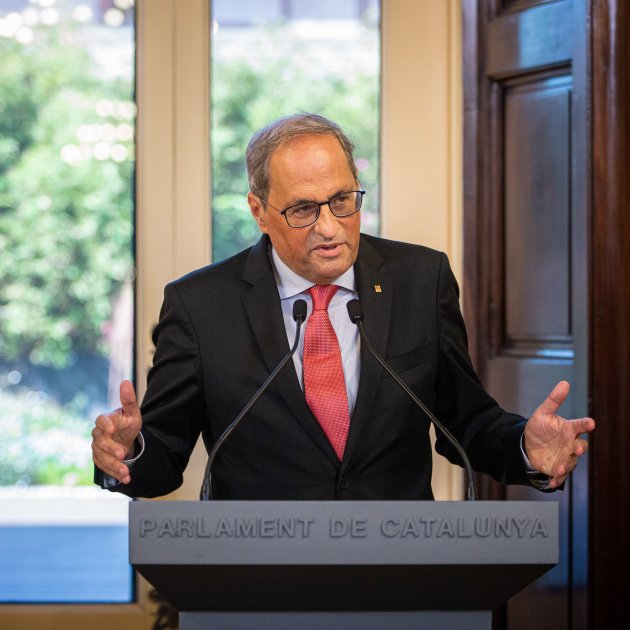A second sentence. The judge of Barcelona criminal court number 6 has sentenced Quim Torra to 15 months of disqualification from public office and a fine of 24,000 euros for not taking down a banner from the government palace that read Free political prisoners and exiles as he had been required to do by the High Court of Catalonia (TSJC), in September 2019, even though it was not in an electoral period. The case was initiated following a complaint made by the Spanish organization Impulso Ciudadano. The sentence is not final and can be appealed to the Barcelona Audience.
This is the second conviction of the 131st president of the Generalitat of Catalonia for the such an offence. The first time, the offending banner - featuring a yellow ribbon and a text that referred in part to the Catalan pro-independence leaders serving jail sentences for sedition, who were eventually given partial pardons by the Spanish government in 2021 - was left hanging in Plaça St Jaume by president Torra during an election campaign in spring 2019, after its removal was requested by Spain's Central Electoral Commission (JEC), and for this he was eventually removed from his Catalan presidential post in September 2020. He was banned from holding public office for a year and a half, a period which ended in April, as well as being fined 30,000 euros.
Second trial
In the second trial, held in March this year, the prosecutor again asked for a 20 month ban on holding public office and a fine of 30,000 euros, while his defence lawyer, Gonzalo Boye, asked for acquittal. Judge Diana Marcelo agreed to try Quim Torra in absentia, as permitted by law and with the agreement of all parties. Torra made a video on the morning of the trial, announcing that he was not appearing in court because he considered it "a political trial." The prosecutor accused him of disobedience because the High Court of Catalonia (TSJC) had given him 48 hours to remove the same banner as a few months previously, and Torra did not do so, alleging that the order violated freedom of expression. Finally, the court ordered the Mossos d'Esquadra police to remove it, but before that, some employees of the Generalitat palace saved them the job.
In the 18-page sentence document, the judge reproduces the reasoning of the earlier ruling that first convicted Torra, and considers that it analyzes the same issue as the current case and concludes that “the facts of the defendant cannot be protected by the legitimate exercise of alleged fundamental rights or parliamentary inviolability”. Nor did she accept the claim for acquittal, considering that the order given by the TSJC was correct. Thus, with the documentary and testimonial evidence analyzed, the judge concluded that Torra was guilty of a crime of disobedience.
Devastating dissent
At the end of April, the High Court of Catalonia (TSJC) announced that it had “accepted as completed” the punishment of president Torra with effect from January 3rd, 2022 for his first disobedience conviction. Just a few weeks earlier, on March 4th, the Spanish Constitutional Court had published the full details of a majority ruling denying the constitutional appeal by the former Catalan president, against that same sentence.
Although the majority of the Constitutional Court upheld the sentence, there were two devastating dissenting opinions, delivered by judges Juan Antonio Xiol and Ramón Sáez, in their opposition to the court majority. Specifically, Xiol, who is vice-president of the Constitutional Court, stated that he had "well-founded doubts" that Torra's banning from office complied with the principle of proportionality in relation to the right of access to public office, and therefore asked his court colleagues to open an internal procedure to raise a question of unconstitutionality of the article of the Penal Code that includes the disqualification from office, delimited specifically to the case of Torra, because the law "does not include a modulation or weighting" of such disqualifications. Meanwhile, the other dissenting opinion, that of judge Ramón Sáez, endorsed Xiol's opinion and added that, as Torra alleged, his right to an impartial judge had been violated, with reference to judge Jesús Maria Barrientos, the president of the Catalan High Court which tried him, for having made statements against the Catalan independence process and then judging one of its leaders. This opinion also questioned why he was removed from his status as an MP when the action for which he was convicted was as president of the Generalitat.
